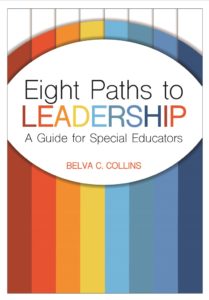12 Ways to Support Families of Students with Disabilities
March 20, 2018
Families are the ones who know your students best—their strengths and needs, their likes and dislikes, their hopes and dreams. And the more effectively you work with and support the families of your students, the more your students will benefit.
It’s important to form powerful partnerships with all families, but today’s post focuses on building a supportive relationship with families of children with disabilities. Excerpted and adapted from Eight Paths to Leadership by Belva C. Collins, these 12 practical suggestions will help you gain new insight into families’ needs, connect them with valuable resources, and welcome them as respected members of their child’s school team.
Conduct a reflection exercise. Reflect on the last educational planning meeting you attended as a teacher. What do you think went right in the meeting? What specific things could have improved it? Write down your responses and use them as a guide to improve your next meeting.
Interview a family. Conduct an interview with a family of a child with a disability. How do the family members feel about the educational process for their child? Do they see their relationship with the teacher as a true partnership? Why or why not? Use the insights you uncover to strengthen your work.
Learn more about the effects of poverty. Socioeconomic status can affect the performance of students with disabilities and the educational participation of their families. Do some internet research on the various ways poverty may affect the families in your community. Find data on the prevalence of poverty in your community and demographics about who is affected. Have the prevalence and/or demographics changed in the past 10 years? If so, how? Find and read literature on educating students who experience poverty, such as this free resource from the National Education Association.
Make IEP meetings a positive experience. Are your IEP meetings as comfortable and welcoming to families as they could be? Here are some things to do:
- Provide a summary or an agenda ahead of time
- Create an IEP draft that includes goals that the family values
- Meet in a setting that’s comfortable for the family and greet them warmly on arrival
- Arrange seating so that all parties have equal status
- Provide an interpreter, if necessary, who is familiar with the family’s culture, language, and any jargon that may be used in the meeting
- Hand out helpful supplementary materials–a chart to summarize the discussion, a “cheat sheet” of terms
- Follow up afterward to see if the family has additional thoughts or questions
Communicate regularly. Families often express frustration when they’re not kept in the loop about their child’s progress. Be sure to communicate often with families, and ask them which mode they prefer—telephone calls, letters, email, or occasional face-to-face meetings. If one mode isn’t working well, give another one a try. And when you communicate, challenge yourself to listen as much as you speak, so that families know you respect their views and knowledge about their child.
Make it easy for family members to get involved. Share information with families on how to become involved in school activities and take on leadership roles. Point them to resources on how to join and participate in the PTA, volunteer activities, and family councils.
Offer families evidence-based practices (EBPs). Tell families how important and beneficial it is to use EBPs with their children, and ask family members if they’d like you to share these practices with them. Explain that consistently using the same strategies at home and school can help their children learn faster and apply their new skills in environments where they are needed. (Be careful not to pressure families to use EBPs.)
Help families find high-quality resources. Some of the resources that families find on their own may not reflect best practices. Make a list of legitimate websites and other trusted resources that present EBPs, so you can easily share reliable information with families. Directing them to online learning modules, for example, can save families the cost, time, and travel associated with face-to-face training.
Point families to support groups. Use the internet to find professional organizations (e.g., The Arc, Autism Society, Down Syndrome Society, TASH) that offer support groups for families. Are support groups affiliated with these organizations offered in your community? Is support offered online (e.g., through discussion groups)? Create a list of valid support group networks to share with families and help them benefit from these valuable connections.
Think beyond parents. Remember that many families consist of more than the child’s parents. When you’re developing family partnerships, make an effort to include siblings, extended family members, and other caregivers who wish to be involved. (This blog post gives you some starter suggestions for involving siblings.)
Respect each family’s culture. There are complex issues at play in the lives of each of your students. Recognize that each family is unique, even within a specific culture. Instead of making generalizations and assumptions, use data on each individual family to guide you in your work. Respect the position of families who cannot or choose not to be involved in their child’s school.
Set an example. Lead by example in your school—model positive ways of speaking with and interacting with families, so that other teachers and staff members will follow suit.
CHECK OUT THE BOOK
 In this empowering professional development resource, Belva Collins shows special educators how they can pursue eight different paths to leadership so they can make a powerful difference in schools, communities, and the lives of their students. Explore the description, reviews, and table of contents for Eight Paths to Leadership!
In this empowering professional development resource, Belva Collins shows special educators how they can pursue eight different paths to leadership so they can make a powerful difference in schools, communities, and the lives of their students. Explore the description, reviews, and table of contents for Eight Paths to Leadership!




Write a Comment
Your email address will not be published. Required fields are marked *
comments
Santese Jourdain says
I'm a grandmother trying to fine out if I can get paid to watch grandson that is artistic in Florida can anyone help
Post a Comment